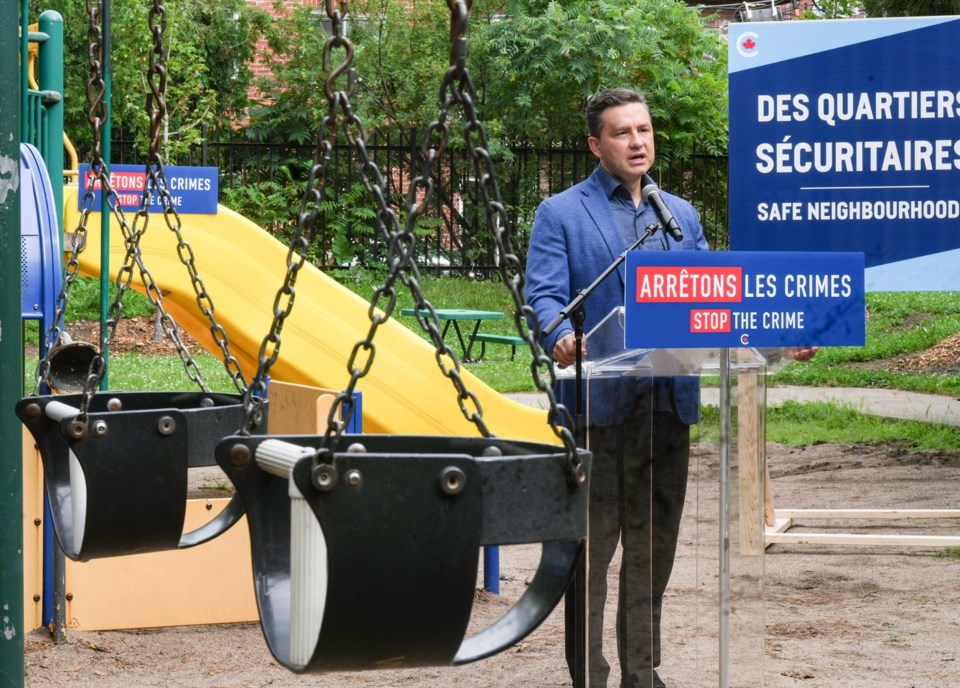MONTREAL — Federal Conservative Leader Pierre Poilievre is attacking the Montreal mayor's approach to severe drug addiction and homelessness, accusing her of telling Montrealers to learn to live with "chaos."
Poilievre spoke Friday morning near a housing project with a supervised drug-use site west of downtown that has drawn criticism because of its location near an elementary school. He called for the site at Maison Benoît Labre to be immediately shut down, and promised to close other such sites located near schools or playgrounds if he becomes prime minister.
"Here at this beautiful school, we're seeing children terrorized by drugs, by potential violence, by gross sex acts, by needles and other danger," he said, describing the situation as the result of a "wacko liberalization experiment of drug legalization."
The site, which opened earlier this year in the St-Henri neighbourhood, includes 36 studio apartments for people experiencing homelessness and living with addiction or mental health issues. Also inside the building is the city's first supervised drug-use site able to accommodate drug inhalation as well as other forms of consumption.
In recent months, parents have told Montreal La Presse that they've seen open drug use and aggressive behaviour as they take their children to and from the elementary school less than 100 metres away.
Poilievre took repeated aim at Montreal Mayor Valérie Plante as well as Prime Minister Justin Trudeau, whom he said should use federal power under the Controlled Drugs and Substances Act to close down the site.
Calling Plante an "NDP-Liberal mayor," the Tory leader said she "has even insisted Montrealers should just learn to live with this chaos and this danger. She says we should just accept homelessness."
The federal Opposition leader also criticized Plante's goal of improving what she calls "cohabitation" between residents and organizations offering services to vulnerable people.
"This is the latest Orwellian terminology that the radical wacko … politicians like Plante and Trudeau are inventing," he said. "And what they mean by that is that kids should have to cohabitate with people who are using crack, heroin, cocaine and other hard drugs in play parks."
Plante did not immediately respond to Poilievre's comments on Friday. Earlier this week, she announced that the city will hold public consultations on how to better integrate community services — including homeless shelters and drug-use sites — into neighbourhoods amid rising public concern that they attract violent, aggressive and inappropriate behaviour.
"If we want to adequately respond to the growing needs of vulnerable people, all stakeholders must do more to better plan the opening of resources in neighbourhoods and take into account the needs of the population," Plante said Tuesday in a statement. "We must move forward with lucidity while understanding the real issues linked to cohabitation and the feeling of security so that everyone can live with dignity and security in Montreal."
Liberal cabinet minister Marc Miller, who represents the riding where Maison Benoît Labre is located, said the purpose of the shelter is to serve as a place of transitional housing.
He acknowledged the presence of the supervised injection site is causing problems for parents of schoolchildren and for neighbours, but said in a statement that it's due to a lack of qualified staff.
"Harm reduction measures such as supervised injection sites are evidence-based and save lives," he said. "However, it's important they they're administered in the right way.
"Pierre Poilievre weaponizes this issue to incite fear. He doesn't care about the parents or the importance of good neighbourliness. He's hijacking their concerns for his own political motives."
Maison Benoît Labre said Friday it did not want to enter a political debate, but its executive director defended its services as "essential to respond to the increase in homelessness and the overdose crisis." Andréane Desilets said the centre would continue to work with governments and the health authority to maintain services.
Montreal's public health department also defended Maison Benoît Labre, which includes housing for people exiting homelessness, psychosocial support and a day centre. It said that only a minority of users, or an average of eight people per day, use the two supervised consumption cubicles.
"Direct interventions in homelessness and overdose prevention had to be implemented in the neighbourhood to meet the needs of the population where they are, in order to maximize the chances of reaching them and to reduce consumption on the street and surrounding areas," spokesperson Marianne Paquette wrote in an email. She noted the centre has taken steps to alleviate safety concerns. The centre has said those steps include hiring cleaning brigades and security personnel.
Friday was not the first time Poilievre has taken aim at Plante. In January, he called her and Quebec City Mayor Bruno Marchand "incompetent" and accused them of blocking construction projects.
On Friday, the federal Opposition leader also repeated a previous statement saying Plante's administration has made a "radical" request that Ottawa legalize hard drugs in Montreal — something the mayor has previously described as a mischaracterization of her support for the decriminalization of simple possession of small quantities of drugs.
In a response in May, Plante's office accused Poilievre of conflating drug legalization with drug decriminalization. A spokesperson said the city had not made a formal request to the federal government, despite a unanimous position from the Montreal municipal council in favour of the principle.
This report by The Canadian Press was first published July 12, 2024.
Morgan Lowrie, The Canadian Press



